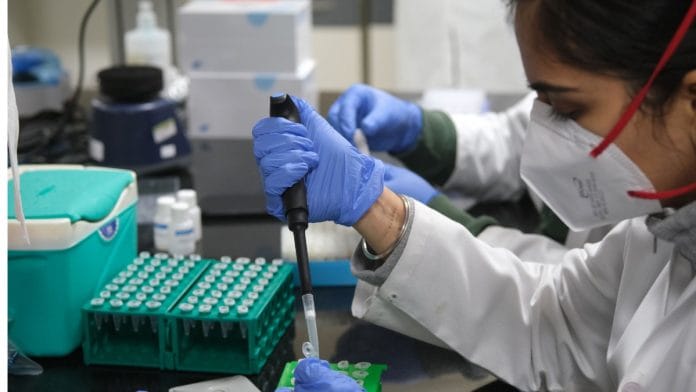New Delhi: Six private laboratories have now been included in India’s genomic sequencing consortium — a network of laboratories that have been tracking genetic mutations of the SARS-CoV-2 virus, which causes Covid-19, circulating within the country.
The Indian SARS-CoV-2 Genomic Consortia (INSACOG) was set up in January last year, with initial participation of 10 national research laboratories belonging to the Department of Biotechnology, Indian Council of Medical Research, Council of Scientific and Industrial Research and Ministry of Health and Family Welfare.
Later, 33 more research laboratories were included in the network, to enhance sequencing efforts in the country. These 43 laboratories operate on a hub-and-spoke model, where the 10 INSACOG Genome Sequencing Laboratories (IGSLs) guide new laboratories and act as hubs.
In an order dated 22 February, accessed by ThePrint, the Department of Biotechnology (DBT) approved the inclusion of six private laboratories in the consortium. These include Strand Life Sciences, Genotypic Technologies, Medgenome and Eurofins Genomics India — all based in Bengaluru — along with the Delhi-based CARINGdx and Neuberg Supratech Reference Laboratories, Ahmedabad.
According to a bulletin released by INSACOG last month, as of 10 January, India has sequenced a total of 1,28,901 samples from Covid patients, which amounts to less than 1 per cent of the total number of people who have been infected in India.
To expand its network, the DBT is now also adding private laboratories to the network.
Anurag Agrawal, director, Institute of Genomic and Integrative Biology and head of the INSACOG, told ThePrint that inclusion of the private laboratories was pending and desirable, and added that the private sector is quite capable of handling the task.
Also read: Covid patients from 1st & 2nd waves can still feel buzzing in ears, doctors say it’s a concern
No voluntary access for people
All samples for sequencing will continue to be collected and distributed by the National Centre for Disease Control (NCDC), and private individuals will not be able to voluntarily get their samples sequenced from these labs.
“At this point I would not see any clinical use for a person going to get their samples sequenced,” said Agrawal.
According to the DBT order, sequencing costs will be met by the private laboratories and patients will not be charged for sequencing. The laboratories will also be required to clearly indicate the source of funding for undertaking sequencing activities.
The NCDC will also be assessing the laboratories and infrastructure of the private laboratories from time to time. All patient information will be protected and the laboratories will not be allowed to share the sequencing information with the public.
Instead, all sequencing information will be submitted to the national portal.
(Edited by Poulomi Banerjee)
Also read: 19 lakh Indian kids lost a parent or caregiver to Covid, says Lancet study of 20 countries






